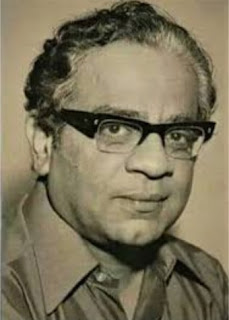Pu La Deshpande
Remembering Pu La Deshpande on his birth anniversary:
Purshottam Laxman Deshpande (8 November 1919 – 12 June 2000) popularly known by his initials ("Pu La") or as P. L. Deshpande, was a Marathi writer and humorist from Maharashtra, India. He was also an accomplished film and stage actor, script writer, author, composer, musician (he played the harmonium), singer and orator. He was often referred to as "Maharashtra's beloved personality". Deshpande's works have been translated into several languages including English.
Early Life
Purushottam Laxman Deshpande was born in Gamdevi Street, Chowpati, Mumbai. His parents were Laxman and Laxmibai Deshpande. His maternal grandfather, Vaman Dubhashi was a poet and writer of literature. He had translated Rabindranath Tagore's, Gitanjali, into Marathi under the title "Abhang Gitanjali".
The family used to stay at Kenway House, Procter Road in the Grant Road locality in Mumbai. His family then moved to Jogeshwari. His first 8 years at the newly formed Saraswati Baug Colony are described in the story titled 'Balpanicha Kaal Sukhacha' (translation: the happy days of childhood) in his book Purchundi. The family then moved to Vile Parle. His father was working at Advani Paper Mill on daily wages. He earned 150 rupees monthly.
Education
Deshpande studied at Parle Tilak Vidyalaya. He attended Ismail Yusuf College after high school and then Government Law College, Mumbai for his LLB. Later, he attended Fergusson College in Pune and obtained his Bachelor of Arts, (BA) in 1950 and then obtained his Master of Arts (MA) from Willingdon college, Sangli. He also took lessons in playing harmonium from Dattopant Rajopadhye of Bhaskar Sangitalaya.
Personal life
His first wife (the former Ms. Sundar Divadkar from a family in Karjat) died soon after the wedding in the early 1940s. On 12 June 1946, Deshpande married his colleague, Sunita Thakur.Thakur was to go on to become an accomplished writer in her own right. The couple did not have any children, they loved their nephew, Dinesh Thakur like their own son.
Professional life
Both Deshpande and his wife served as teachers in Orient High School, Mumbai. He also worked for some years as a college professor in Rani Parvati Devi College Belgaum, Karnataka and Kirti College, Mumbai. He also worked for newly founded Doordarshan, the state owned Indian TV. He was the first person to interview the then Prime Minister Jawaharlal Nehru on Indian television. He was seconded to the BBC for a year-long training. After this he spent some time in France and in West Germany. It was about this specific period and stays in these countries that his later travelogue "Apoorvai" was to be based. His other travelogue include "Poorvaranga" and "Jave Tyanchya Desha".
Accomplishments
Pu La Deshpande was a proficient Hindustani classical musician. He went on to gain fame as an author, screenplay writer, actor, director, music director and singer. He participated in several philanthropist activities.
Death
Deshpande died in Pune, Maharashtra on 12 June 2000 due to complications from Parkinson's disease. He was aged 80. He was survived by his wife Sunita. He died on the 54th anniversary of their wedding. Sunita died after P.L. Deshpande, in 2009.
Bibliography
Most of Deshpande's literary contributions are deeply rooted in Marathi language. Although he wrote across several genres, he was particularly well known for his humorist literature. He produced several original works and also adapted of prominent works from other languages into Marathi. Prominent examples include the 1952 film अंमलदार (Ammaldar, based on Nikolai Gogol's Inspector General) and the 1962 book (Kay Watayl Tay Hoeel, based on translation of Helen and George Papashvily's script of Anything Can Happen). He referred to his adaptations as paraphrasing instead of the conventional "translation" or "adaptation".
Filmography
Kuber – 1947: actor and playback singer
Bhagyaresha – 1948: actor and playback singer
Vandemataram – 1948: actor and playback singer
Jaga Bhadyane Dene Ahe – 1949: screenplay and dialogues
Manache Pan – 1949: – story, screenplay, and dialogues; co-music director in collaboration with G D Madgulkar
Mothi Manase – 1949: music director
Gokulacha Raja – 1950: Writer of Story, Screenplay, and Dialogues
Jara Japoon – 1950: Writer of Screenplay and Dialogues
Johar Maybap – 1950: Actor
Nawara Bayako – 1950: Music Director and Writer of Story, Screenplay, and Dialogues
Hi Wat Pandharichi – 1950: Actor
Pudhache Paool – 1950: Actor and Writer of Screenplay and Dialogues in collaboration with G D Madgulkar
Var Pahije – 1950: Actor and Writer of Screenplay and Dialogues in collaboration with Achyut Ranade
Dewa Pawala – 1950: Music Director
Doodh Bhat – 1952: Music Director and Writer of Story, Screenplay, Dialogues, and Lyrics
Ghardhani – 1952: Music Director and Writer of Screenplay, Dialogues, and Lyrics
Nawe Birhad – 1952: Writer of Story and Screenplay
Maisaheb) – 1952: Music Director and Writer of Screenplay and Dialogues
Sandesh) [in Hindi] – 1952: Writer of Story, Screenplay, and Dialogues
Dewabappa) – 1952: Music Director and Writer of Story, Screenplay, Dialogues, and Lyrics
Gulacha Ganapati – 1953: Director, Music Director, actor, and Writer of Story, Screenplay, Dialogues, and Lyrics
Phool Aur Kaliyan) [in Hindi] – 1960: Story writer
Aaj Aur Kal [in Hindi - 1963: Story writer
Chimanarao Gundyabhau – 1979: Narrator
Ek Hota Vidushak – 1993: Screenplay and Dialogues
Awards:
Sahitya Akademi Award – 1965
Padma Shri – 1966
Sangeet Natak Akademi Award – 1967
Sangeet Natak Akademi Fellowship – 1979
Kalidas Samman – 1987
Padma Bhushan – 1990
Punyabhushan – 1993
Maharashtra Bhushan Award – 1996
a stamp was issued in his honour - 2002
Honorary Doctor of Literature Degrees from Rabindra Bharati University (1979), University of Pune (1980) and Tilak Maharashtra University (1993)
The "P. L. Deshpande Maharashtra Kala Academy" was established by the Government of Maharashtra in Mumbai to honour his contributions to Marathi literature – 2002
A garden, Pu. La. Deshpande Udyan (also known as "Pune-Okayama Friendship Garden"), in Pune was named after him in commemoration.



Comments
Post a Comment